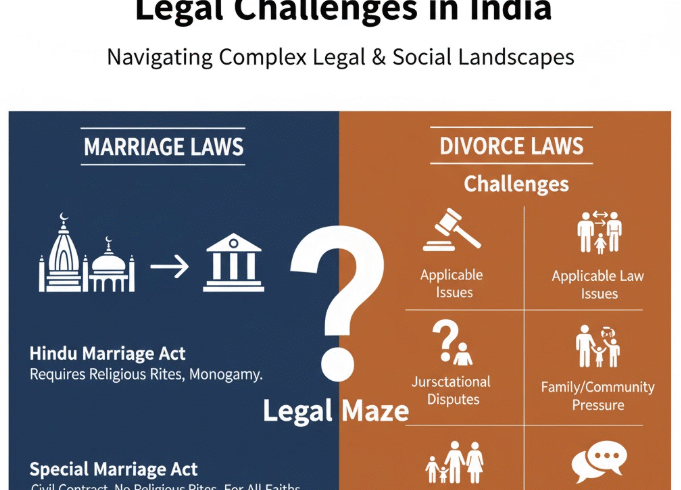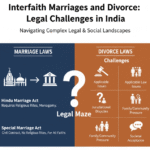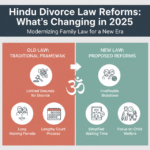Civil vs Religious Divorce: Which is Right for You?
When a marriage ends in India, couples have a dizzying array of options: They can file for civil divorce; strive for separation under either the Divorce Act or special marriage rules without having to prove fault; or seek what Wazir said is “the easiest process,” with its religious diktats dictating how and why. This choice doesn’t just impact the paperwork, but your legal rights, possessions, children and a potential future remarriage. So, let’s look at everything you need to know so that you can make the right decision for your needs.
Why It Matters More Than You Think
Let’s say Ayesha and Rajiv were divorced in their religious community three years ago. They split everything up on an unspoken, casual basis and went their own ways. But when Rajiv attempted to purchase a house last month, he learned that his “ex-wife” was still in reality married to him according to government documents. Banks refused his loan. Insurance companies questioned his status. His new partner could not be listed as a nominee on any carrier.
It happens more frequently than you think. In India, religious and civil divorces are totally separate aspects. Having one does not ensure the other. Knowing this distinction could help you avoid a world of trouble, financial distress and anxiety later on.
What Exactly is Civil Divorce?
Civil divorce is the legal dissolution of your marital relationship through the court system. It is governed by the laws enacted by Indian Parliament and state legislatures. Instead, with a civil divorce, you go before a judge who reviews your case and makes an order that the government then officially records as evidence that your marriage has ended.
Civil Divorce in India and How It Works
The procedure generally proceeds as follows:
Who Files the Petition: A spouse (or both) will file a petition for divorce in family court. You have to present reasons for divorce in court as the law provides.
Court Action: Parties appear at court hearings. The judge could recommend counseling or mediation to try to save the marriage.
Proof and Rebuttal: Attorneys offer up proof, documents, and argument in favor of why the divorce should be granted.
Decree: Once the judge is comfortable with everything, they decree a divorce. This piece of paper is your official proof that you’re legally divorced.
Government Records: An entry gets made in state and national government records declaring your new status.
Which Law Applies to You?
India has several civil laws based on religion:
| Religion | Law Applicable |
|---|---|
| Hindus, Sikhs, Jains, Buddhists | Hindu Marriage Act 2 of 1955 |
| Muslims | Muslim Personal Law (Shariat) Application Act 26 of 1937 & The Dissolution of Muslim Marriages Act of 1939 |
| Christians | The Indian Divorce Act 34 of 1869 |
| Parsis | The Parsi Marriage and Divorce Act, Parliamentary Act No. III of 1936 |
| Inter Religious marriages | Special Marriage Act – Parliamentary Act No. 43 of 1954 |
Each law has its own divorce grounds, waiting periods, and process.
What is Religious Divorce?
Religious divorce is the process of dissolving your marriage through the rules and customs of your religion. Different religions have different procedures:
Hindu Religious Divorce: Hinduism, traditionally, lacks a code for divorce. Most Hindus obtain a civil divorce to terminate a marriage, but some have religious divorces carried out too.
Muslim Religious Divorce: Islam recognizes diverse types of divorce:
- Talaq: The husband says the word ‘talaq’ three times, and is granted an instant divorce (recently banned by law)
- Khula: The wife asks for a divorce, and sometimes returns her mahr (dower)
- Mubarat: Consent of both the parties to dissolve marriage
- Talaq-e-Tafweez: Wife is entitled to pronounce Talaq in the manner the husband has authorized in Nikahnama
Christian Religious Divorce: The Church does not typically grant divorce. However, certain Christian denominations permit annulment (declaring the marriage null and void) in cases of some form of infidelity. Most Indian Christians resort to civil courts for divorce.
Parsi Religious Divorce: There can be a process of receiving guidance from Parsi religious leaders, but divorce is a legal proceeding in the civil courts under the Parsi Marriage and Divorce Act.
The Big Catch on Religious Divorce
The thing that surprises many people: religious divorce, by itself, has no legal status in Indian courts. You may be divorced in the eyes of your religious community, but for the government, you’re still married. This creates serious problems.
For more detailed information on family law matters, visit Zista Legalis.
What the Differences Mean for Your Life
Let’s examine more closely how these different creatures, litigated and mediated divorce, play out in your day-to-day life.
Legal Recognition and Official Documents
Civil Divorce:
- Recognized by all government departments
- Updates: In Aadhaar, PAN card, passport, voter ID etc.
- It is accepted by banks, insurance companies and employers
- Permits legal second marriages throughout India
Religious Divorce:
- Known only in your religious community
- No change in government records
- Not recognized by banks, insurance companies or government buildings
- Cannot remarry unless divorced by civil court
Property and Financial Rights
Civil Divorce:
- Decree of court for division based on law
- Clarity to alimony and maintenance provisions
- Protection of wife’s interest in husband’s property
- Court-ordered child support amounts
- Enforceable through legal system
Religious Divorce:
- No court enforcement of agreements
- The division of property is subject to community habits
- Loss of wife’s legal interest in property
- No guaranteed alimony or maintenance
- Difficult to enforce financial commitments
Children’s Custody and Rights
Civil Divorce:
- Court shall award custody with regard to the best interest of children
- Visitation rights clearly defined
- Child support mandatory and enforceable
- Educational and medical decisions outlined
- May alter custody based on changes in circumstances
Religious Divorce:
- The issue of custody is dealt with in accordance with the religious practice (which usually includes favoring the father)
- No legal binding of access rights
- Child support depends on goodwill
- No formal agreement on how child should be raised
- Difficult to claim rights later
Remarriage Rights
Civil Divorce:
- Freedom of right to remarry after final decree
- New marriage is legally valid
- The new spouse acquires all legal rights
- Stepchildren have inheritance rights
- Children in new marriage get full inheritance
Religious Divorce:
- Remarriage in same faith allowed
- New marriage not legally recognized
- First marriage still exists legally
- Risk of bigamy charge if you marry again
- New spouse isn’t legally entitled
Breaking Down the Costs
Money talks when you’re in the midst of breaking up. Let’s compare the financial aspects:
Civil Divorce Expenses
| Item | Expense Category | Approximate Cost (INR) |
|---|---|---|
| 1 | Court Filing Fees | 1,000 – 5,000 |
| 2 | Lawyer Fees (Uncontested) | 15,000 – 50,000 |
| 3 | Lawyer Fees (Contested) | 50,000 – 5,00,000+ |
| 4 | Documentation | 2,000 – 10,000 |
| 5 | Mediation/Counselling | 5,000 – 25,000 |
| 6 | Travel and Court Appearances | 5,000 – 30,000 |
| Total (Uncontested) | 28,000 – 1,20,000 | |
| Total (Contested) | 1,00,000 – 10,00,000+ |
Religious Divorce Expenses
| Expense Category | Cost (INR) |
|---|---|
| Religious Authority Fees | 0 – 10,000 |
| Community Mediation | 5,000 – 25,000 |
| Religious Ceremony | 5,000 – 30,000 |
| Documentation | 1,000 – 5,000 |
| Total | 11,000 – 70,000 |
Important Note: While it may appear more affordable at the outset, if you choose religious divorce without legal recognition and down the line want to receive that recognition, you will still need to pay for civil divorce. This means paying twice.
Timeline: How Much Time Does Each One Take?
Civil Divorce Timeline
Mutual Consent Divorce:
- Time from first motion filing to cooling-off period: 1 day
- Cooling-off period: 6 months (waivable by courts, according to a Supreme Court ruling in 2024)
- Second motion to final decree: 1 – 3 months
- Total Time: 6-9 months (or 2-4 months if waived)
Contested Divorce (one party opposes):
- Submission of petition to first hearing: 2-4 months
- Court hearings and evidence: 1-3 years
- Closing arguments and decree: 6 to 12 months
- Overall Time: 2-5 years (in the more extreme cases longer)
Religious Divorce Timeline
- Muslim Talaq: Can be finished in 3 months (post legal reforms)
- Christian Annulment: 6 months to 2 years
- Other Ritual Operations: 1 week to 6 months
Religious divorce is often faster, but don’t forget — it does not afford you the legal closure.
Recent Changes in the Law You Should Know About
Indian divorce laws are evolving. Here is some important new information as of 2025:
Supreme Court Ruling on Cooling-Off Period (2024): Courts now have the discretion to waive the six-month cooling-off period in mutual consent divorce, upon both parties’ insistence. This speeds up amicable separations.
Triple Talaq Ban (2019): Muslim men can no longer legally divorce their wives by saying “talaq” three times. They have to go through a three-month process and register the divorce.
Enhanced Maintenance Rights (2023): The courts have established that the woman’s living standards should be unchanged even after divorce. Maintenance amounts have increased significantly.
Child Custody Reforms: Now preference of child also plays a more important role, mainly when the child is over 12 years.
Remote Court Hearings: A lot of family courts are now making digital hearings available.
Can You Get Both Kinds of Divorce?
Here, the answer is often yes — and that’s usually the wisest response. Here’s how it works:
The Two-Step Process
Step 1 – Get a Civil Divorce: You can file for divorce in Family Court. This safeguards your legal rights, and bestows you with an official status of being divorced.
Step 2 – Religious Divorce and Closure: Once you have a court judgment, close your religious divorce. This is what makes you feel accepted within your own community.
With this method you get both the legal one and the religious/social one. Many lawyers recommend this path.
Which Should You Do First?
Start with Civil Divorce if:
- You need property and financial protection
- You want to remarry legally
- There are custody disputes
- Your spouse is uncooperative
- You require court to enforce agreements
Start with Religious Divorce if:
- Both parties are cooperating fully
- Community pressure is significant
- You intend to file civil divorce shortly
- The urgency of religious acceptance on a personal level
Best cautionary advice: Never depend solely on religious divorce. Never skip civil divorce, a safeguard through the legal system.
Common Mistakes People Make
Mistake 1: Believing in the Myth of a Religious Divorce
Some few thousand people, years later, find out they’re still legally married. This creates problems with:
- New marriages (bigamy)
- Property transactions
- Insurance claims
- Inheritance matters
- Children’s legitimacy from new relationships
Mistake 2: Informal Agreements
Some spouses privately negotiate the terms of a divorce and do not obtain court approval. These are difficult agreements to enforce. You have no recourse if your ex-spouse doesn’t abide by the agreement.
Mistake 3: Skipping Legal Advice
Family and community elders have good intentions, but they are not lawyers. Religious divorce processes differ, and it is important that you have experienced counsel to stand up for your rights.
Mistake 4: Hiding Assets
Some people play games with cash or real property in divorce. This is not allowed, and courts can actually punish you for it. Full disclosure is mandatory.
Mistake 5: Using Child Custody as a Bargaining Chip
Do not use custody or visitation to squeeze financial concessions. Courts don’t like it and it hurts your children emotionally.
Special Situations – and How to Deal with Them
When Your Spouse Lives Abroad
If one’s spouse is a citizen of another state, civil divorce is required. You will not be able to use that religious divorce for immigration, visas and international assets. You can still get divorce if your spouse is abroad in Indian courts.
Inter-Religious Marriages
If you married someone of another religion, chances are, you used the Special Marriage Act. Your divorce must be from a civil court under that same act. Religious divorce won’t apply.
When There’s Domestic Violence
If you have been abused – file for immediate civil divorce with a variety of claims coming under the Protection of Women from Domestic Violence Act, 2005. No need to use religion as an intermediary in abuse cases—safety over all.
When You Can’t Pay Court Fees
There is representation provided to those who cannot afford lawyers. There are legal aid cells in every state that offer free assistance. District legal services authorities are there to ensure that common people get justice.
A Practical Checklist for Making Your Decision
Ask yourself these questions:
About Legal Protection:
- [ ] Do I need the court to enforce property division?
- [ ] Am I worried about custody?
- [ ] Do I need alimony/maintenance to be certain that I’ll get it?
- [ ] Will I get married again?
- [ ] Is there paperwork to update?
About Timeline:
- [ ] Can I wait 6-24 months for civil divorce?
- [ ] Is expeditious resolution more important than legal certainty?
- [ ] Am I currently in danger (domestic violence)?
About Finances:
- [ ] Am I financially able to cover costs of civil divorce?
- [ ] Can I expect my spouse to get along?
- [ ] Do we own large amount of property/assets jointly?
- [ ] Will I continue to require financial support?
About Community:
- [ ] How important is community acceptance?
- [ ] Will my family accept civil divorce?
- [ ] Are there community pressures against me?
- [ ] Is remarriage allowed in my religion after a divorce?
If you responded affirmatively to most of the questions in either of the first two categories, then civil divorce is a necessity. You can add a religious divorce on top of it, for communal acceptance or not, but never shortcut the legal one.
What Lawyers Recommend
This is the general idea that most family law experts propose:
- Talk to a lawyer: Before you tell your spouse or family, know what legal rights and options you have.
- Document everything: Maintain records of assets, income, agreements and any abuse or mistreatment.
- Consider mediation: Court-ordered mediation can mean a more speedy, less painful divorce but still give you legal protection.
- File civil divorce: Begin the legal process to protect yourself.
- Think about religious divorce at the same time: If it is important for you, keep pursuing your religious divorce alongside the civil process.
- Get it in writing: Never take someone at their word, even if they are a relative or close friend.
- Fully follow through: Don’t halt midway. Be sure to get the final decree and update all records.
Your Path Forward
The divorce process is never easy, but knowing your options helps ease the pain. Here’s your action plan:
Immediate Steps:
- Try speaking to a family lawyer (sometimes initial consultation is free)
- You will need to gather your marriage papers, property documents and financial records
- List your concerns and priorities
- Look for a lawyer or legal aid in your community
Within One Month:
- Choose your lawyer
- Choose the way of civil divorce (mutual consent or disputed)
- Inform your spouse (through lawyer if relations have become so hostile)
- Begin documentation process
Long-term:
- Attend all court hearings
- Participate in mediation honestly
- Keep communication records
- Complete religious procedures if desired
- Amend all official papers on pronouncement
- Seek counseling for emotional support
Remember: Civil divorce protects your rights, property and future. Religious divorce provides community acceptance. For full confidence and protection, go after both — but never neglect the civil legal process.
Your marriage may be over, but your life goes on. Choose the courses that will protect your interests and let you step forward with confidence, not shame.
For expert legal guidance on divorce matters, visit Zista Legalis.
Frequently Asked Questions
Q1: If I get a religious divorce from my husband, does it mean that I am legally divorced in India?
No; religious divorce is not legally recognized in Indian courts. Until a civil court issues you an absolute divorce decree, you are still legally married. You can’t legally remarry and your status in government records remains “married.”
Q2: What is the price of civil divorce in India for 2025?
In case of mutual consent divorce, the amount you need to bear for lawyer fees, court fees and documentation will range between ₹28,000-₹1,20,000. Divorces, especially contested ones cost a lot of money and varies between ₹1,00,000 to ₹10,00,000 or more depending on complexity and span.
Q3: Can I remarry after religious divorce but before civil divorce?
No. You cannot remarry without getting civil divorce. Bigamy is a legal offence in India. A person commits a major criminal act if he gets married to someone else if spouse is alive and marriage has not been dissolved by a decree of divorce. Your new marriage would not even be valid, legally speaking.
Q4: How much time does mutual consent divorce take in India?
It now takes 6-9 months for mutual consent divorce. But following the Supreme Court’s 2024 ruling, courts can allow an exception and lift the mandatory 6-month cooling-off provision for couples who insist; so a couple of months it is.
Q5: Do Muslim women have to resort to court for divorce?
It’s highly recommended. Muslim women can claim Khula through the Islamic authorities, but civil divorce under the Dissolution of Muslim Marriages Act, 1939 is more beneficial for their legal rights to maintenance, property and children.
Q6: My spouse refuses to sign divorce papers. What can I do?
You can file for a contested divorce. If you have legitimate legal reasons (cruelty, adultery or desertion, for instance), you don’t require the signature or consent of your spouse. This takes longer (2-5 years) but you can get a divorce even if your spouse doesn’t want to and isn’t cooperative.
Q7: If I take only religious divorce, will I lose my rights to my husband’s property?
Yes. Without civil divorce, you have no court enforceable claims. Even if the terms of agreement in a case like this were reached during religious divorce, there is no such thing as forced consent. Civil divorce guarantees that the court divides property by law and preserves your share.
Q8: Is it possible that courts waive the 6 months cooling-off period in mutual consent divorce?
Yes. In the wake of recent Supreme Court rulings, Indian courts can now lift the 6-month waiting period that is mandatory for obtaining a divorce — providing both sides strongly want to separate and there’s no chance of reconciliation.
Q9: Can I get an online divorce in India?
Not fully, but there are vast areas in which procedures can be conducted online. Courts are functioning virtually, and you can file e-petitions at e-courts. You do need to physically appear for a few hearings, and court procedures are necessary for the final decree.
Q10: What about children in case of religious divorce only?
Religious deals during divorce do not have any legal value. Parents can come back and claim joint or full custody at any time, and you can’t take anyone to court for visitation or child support. Religious divorce simply doesn’t give you enforceable custody orders, only civil divorce does.
Q11: Can I still turn religious divorce into civil divorce later?
Not exactly. Religious divorce cannot be “converted” but you can file for civil divorce at any time. However, you’re going to have to conduct the whole civil divorce process all over again from the start, including more time, money, and energy. Civil divorce is better from the start.
Q12: From which type of divorce can I claim maintenance—civil or religious?
Legally enforceable maintenance can only be obtained through a civil divorce. Religious divorce can include a provision for maintenance, however you cannot enforce payment by a court without a civil decree of divorce. Section 125 CrPC and personal laws do provide maintenance only through the medium of civil action.
For professional legal assistance with family law matters, contact Zista Legalis today.





